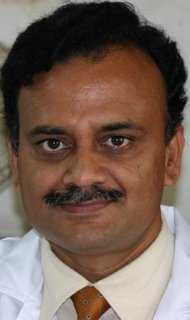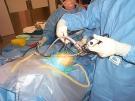Osteoarthritis is the common form of shoulder arthritis. It is due to the wear of cartilage lining. Shoulder arthroscopy, Shoulder resurfacing and replacement offered at an affordable cost by UK trained Orthopaedic Surgeon. Visit www.shoulderindia.com for more information.
Friday, November 25, 2005
Orthopedic treatment in India for NRI's, UK, US citizens
If your shoulder hurts from rotator cuff tears, arthritis, frozen shoulder or dislocates due to a sports injury, then it is time to put your problems behind and get it operated in Chennai, India by UK trained orthopaedic surgeon, Dr.A.K.Venkatachalam. Learn more about your shoulder problem and its solution from http://www.shoulderindia.com/. Surgery is performed under regional or general anesthesia. Open and arthroscopic techniques are performed to deal with the condition effectively. Post op recovery will be painless and smooth due to effective multi modal analgesia with pain pumps, analgesics and cryotherapy. Physio therapists will be firm and gentle to help you regain full function quickly. Nursing care during your short stay will be tender. Rooms are comfortable. Recoup after surgery in sea side resorts by historic mono lithic rock carvings. Soak into the tales of the past. India is the favorite destination for orthopaedic treatment abroad and doctors and hospitals in Chennai are equal to the best in the world.
Wednesday, November 16, 2005
Arthroscopic surgery for shoulder dislocations, rotator cuff tears, India

 www.shoulderindia.com
www.shoulderindia.comArthroscopic shoulder surgery is done for impingement, debridement and repair of rotator cuff tears, instability, recurrent dislocations, spur formation of clavicle( collar bone). A shaver is introduced into the shoulder through tiny key hole incisions and excess bone is burred away. Torn tendons are then repaired to their original attachment with suture anchors. Recovery after shoulder arthroscopy is quick and pain free in Chennai.
Contact the surgeon at akvenkat@shoulderindia.com
Sunday, November 06, 2005
Shoulder problems in Diabetics
Dr.A.K.Venkatachalam,consultant orthopaedic surgeon,Chennai Tel 00 91 9282165002,www.shoulderindia.com.Diabetics have an additional burden of joint problem in addition to their systemic problems of nerves, eyes, blood vessels, kidneys etc.
Diabetics are prone to develop a condition of the shoulders called primary frozen shoulder. It can affect both shoulders in a small percentage of people. It usually resolves over a period of time but can leave behind a lasting deficit of certain movements.
Middle aged diabetics also develop tears of the rotator cuff and this can lead to a secondary frozen shoulder. Rotator cuff is group of tendons on top of the shoulder which help to stabilize the joint.
They can develop calcium deposition in the rotator cuff tendons.
They are prone to develop Gouty arthritis in their shoulders like in any other joints since Gout has an association with diabetes. Gout is a condition due to consumption of uric acid which is a by product of the digestion of red meat.
In this article I shall discuss frozen shoulder.
Definition-
Frozen shoulder (Adhesive capsulitis, periathritis) is a condition characterized by a loss all movements at the true shoulder joint. There is pain initially. Pain settles down and there remains stiffness which sets in over a short period of time. Clever people may recall a traumatic incident. In others it may come on slowly. Stiffness may be permanent. The movement that is maximally affected is external rotation (rotating the arm outwards away from the body). This results in inability to reach behind the head with the hand to tie the hair. When both shoulders are affected elderly women are in an embarrassing situation. Overhead activities are also affected as the degree of elevation of the arm is reduced.
Anatomy
The shoulder is the most mobile joint in the body. Its function is to position the arm in space to reach out to objects and deliver them to the mouth for eating and for other actions. The shoulder is a ball and socket joint formed by the upper end of the humerus (arm bone) and the socket formed by the glenoid of the shoulder blade. It is lined by a bag like capsule. The capacity of this joint is about 15- 20 cc. In frozen shoulder the capacity is reduced to 2- 3 cc. The movements at the shoulder joint occur synchronously with that at joint between the shoulder blade and the torso and are compensated to some extent by this.
History of frozen shoulder-
Only in the last few years has the ideal treatment been suggested. It is a relatively rare disorder of the shoulder and in a population of 20 shoulder patients there may be one or two with this condition.
However many doctors and orthopaedic surgeons label any painful condition as a frozen shoulder and advice physiotherapy. This can make the condition worse.
Recent advances
It has been recently discovered that the answer to frozen shoulder lies in the genes. These genes may also be associated with Diabetes mellitus. The alterations in these genes and chromosomes lead to a distorted response to wound healing and scar tissue formation. Exuberant scar tissue forms in response to trauma. The remodeling of scar tissue collagen is less. When more scar tissue forms in the capsule of the shoulder joint, the normally possible movements are grossly reduced. Diabetics also develop nodules in their palms and feet, another evidence of the exaggerated healing process.
Standard treatment-
This is a combination of physiotherapy and steroid injections when the condition is initially painful. Physio can be done at home. The standard Orthopaedic treatment has been a manipulation under anaesthesia. This carries a theoretical risk of fracture but has not been validated in practice. Since I have pointed out that rotator cuff tears can coexist with a frozen shoulder, the ideal management would be an arthroscopic release of the contracted structures within the joint. An arthroscope is an instrument used to look into joints through tiny key hole incisions. The benefits are less pain after surgery and faster rehabilitation. Since scar tissue formation is minimized, lesser are the chances of recurrence and greater the chance of retaining the full range of movement. The range of movement achieved after the release has to be maintained with physiotherapy. In case there is some tear of the rotator cuff, repair can be done at a later stage.
Diabetics are prone to develop a condition of the shoulders called primary frozen shoulder. It can affect both shoulders in a small percentage of people. It usually resolves over a period of time but can leave behind a lasting deficit of certain movements.
Middle aged diabetics also develop tears of the rotator cuff and this can lead to a secondary frozen shoulder. Rotator cuff is group of tendons on top of the shoulder which help to stabilize the joint.
They can develop calcium deposition in the rotator cuff tendons.
They are prone to develop Gouty arthritis in their shoulders like in any other joints since Gout has an association with diabetes. Gout is a condition due to consumption of uric acid which is a by product of the digestion of red meat.
In this article I shall discuss frozen shoulder.
Definition-
Frozen shoulder (Adhesive capsulitis, periathritis) is a condition characterized by a loss all movements at the true shoulder joint. There is pain initially. Pain settles down and there remains stiffness which sets in over a short period of time. Clever people may recall a traumatic incident. In others it may come on slowly. Stiffness may be permanent. The movement that is maximally affected is external rotation (rotating the arm outwards away from the body). This results in inability to reach behind the head with the hand to tie the hair. When both shoulders are affected elderly women are in an embarrassing situation. Overhead activities are also affected as the degree of elevation of the arm is reduced.
Anatomy
The shoulder is the most mobile joint in the body. Its function is to position the arm in space to reach out to objects and deliver them to the mouth for eating and for other actions. The shoulder is a ball and socket joint formed by the upper end of the humerus (arm bone) and the socket formed by the glenoid of the shoulder blade. It is lined by a bag like capsule. The capacity of this joint is about 15- 20 cc. In frozen shoulder the capacity is reduced to 2- 3 cc. The movements at the shoulder joint occur synchronously with that at joint between the shoulder blade and the torso and are compensated to some extent by this.
History of frozen shoulder-
Only in the last few years has the ideal treatment been suggested. It is a relatively rare disorder of the shoulder and in a population of 20 shoulder patients there may be one or two with this condition.
However many doctors and orthopaedic surgeons label any painful condition as a frozen shoulder and advice physiotherapy. This can make the condition worse.
Recent advances
It has been recently discovered that the answer to frozen shoulder lies in the genes. These genes may also be associated with Diabetes mellitus. The alterations in these genes and chromosomes lead to a distorted response to wound healing and scar tissue formation. Exuberant scar tissue forms in response to trauma. The remodeling of scar tissue collagen is less. When more scar tissue forms in the capsule of the shoulder joint, the normally possible movements are grossly reduced. Diabetics also develop nodules in their palms and feet, another evidence of the exaggerated healing process.
Standard treatment-
This is a combination of physiotherapy and steroid injections when the condition is initially painful. Physio can be done at home. The standard Orthopaedic treatment has been a manipulation under anaesthesia. This carries a theoretical risk of fracture but has not been validated in practice. Since I have pointed out that rotator cuff tears can coexist with a frozen shoulder, the ideal management would be an arthroscopic release of the contracted structures within the joint. An arthroscope is an instrument used to look into joints through tiny key hole incisions. The benefits are less pain after surgery and faster rehabilitation. Since scar tissue formation is minimized, lesser are the chances of recurrence and greater the chance of retaining the full range of movement. The range of movement achieved after the release has to be maintained with physiotherapy. In case there is some tear of the rotator cuff, repair can be done at a later stage.
Wednesday, October 26, 2005
Dr.A.K.Venkatachalam, MS,DNB,FRCS,MCh Orth, shoulder surgeon, Chennai


Shoulder orthopaedic surgeon treats recurrent dislocations, rotator cuff tears, labral tears,impingment frozen shoulder, calcium deposition disease, collar bone arthritis by open and arthroscopic means at Chennai, India.
He trained in the UK under eminent shoulder surgeons and has worked in India, England and the middle east.
Shoulder arthroscopic surgery is cosmetic, less painful and patients quickly recover movement.
Visit www.shoulderindia.com and www.kneeindia.com for further information.
Subscribe to:
Comments (Atom)